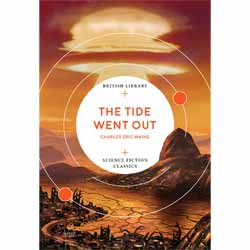|
Click here to return to the main site. Book Review
London journalist, Philip Wade, produces a news piece on the effects of underwater testing of nuclear bombs. Made up of half guesses and conjecture he is surprised to discover that the British Government has censored the piece. Things take a more peculiar turn when he is invited to join a newly formed government department only to discover that his original article had come prophetically close to the truth. Nuclear testing had ruptured the earth’s crust and the ocean was quickly and irrevocably draining away... The Tide Went Out (2019 - Originally Published in 1958. 236 pages) is an apocalyptic tale from Charles Eric Maine and part of the British Library’s excellent reprints of science fiction novels. This is a particularly British post war book. Each country who fought dealt with the aftermath in different ways. The Japanese, the only country to have experienced an atomic bomb, subsumed their fear of death and destruction into a series of monsters, which would regularly ravage Japanese cities. America, who had little experience of the war on their own soil, came out of it full of confidence and bravado. Their post war science fiction had a large vein of cosy apocalypse running through the stories. Often these were centred on ordinary people, who overcame extraordinary events, but for the most part the stories ended, looking forward to a better or at least not so dire future. The British sensibility, with its direct experience of the devastation and randomness of war took on a much more dour tone. Post war American cinema produced classics like The War of the Worlds (1953), When Worlds Collide (1951) and The Day the Earth Stood Still (1951), all excellent films with the common thread that a great many of the population will be ok and may even go on to build a better society. Meanwhile Britain produced, amongst others, The Day the Earth Caught Fire (1961) a film which deliberately leaves the ending open allowing the audience to decide whether everyone lived or died. Tide has many similarities to The Day the Earth Caught Fire, both centre on a journalist as the conduit of information when dealing with the possible end of the world. In the film atomic bombs have pushed the world out of its orbit, leaving it spiralling towards the sun. In Tide a more, seemingly, mundane accident has occurred, a hole in the crust through which the world’s oceans will empty. Maine does a good job at moving the reader from a position of lack of understanding to point out that no oceans mean no rainfall. No water means no crops and the only source of water will be the frozen ice at the poles. Once the penny drops for both the reader and the main character, Maine steps us through the scenario of what this would actually mean. The government engages in fake news to keep the population docile while the elites build their end of the world bunker at the poles. As water becomes scarcer, so does the food, leading to the irrevocable breakdown of society. In Maine’s stories this break down is both bloody and savage as those, who realise that they are being left to die, fight back against those who have the power and money to survive. There are a number of things worthy of note in the book. Maine writes well rounded female figures that neither need nor require rescuing. In fact, he reserves his criticism for the main male protagonist, who is a man of flexible morals, beset with some fairly poor choices. As the story does not fall into the genre of cosy apocalypse you really feel that any or all of the characters could be killed off by the author. If you like your, well written, end of the world scenarios to have a fifties vibe, then I can highly recommend that you check out. It will especially be of interest to readers who have enjoyed a book in a similar vein, Nevil Shute’s On the Beach (1957). 7 Charles Packer Buy this item online
|
|---|

